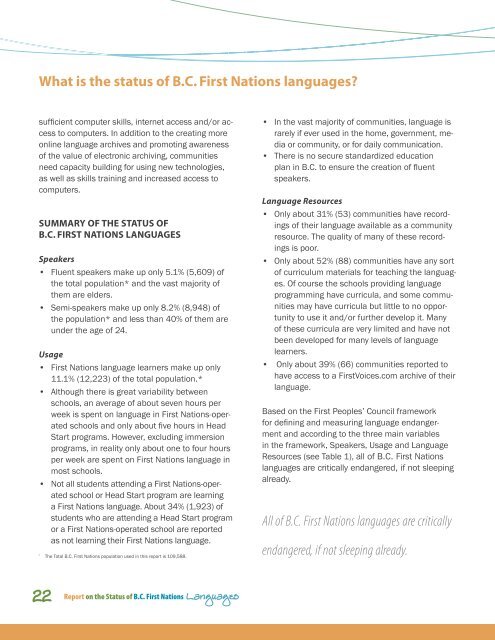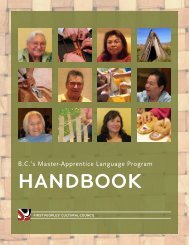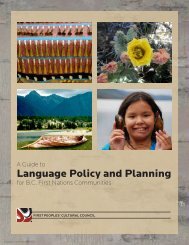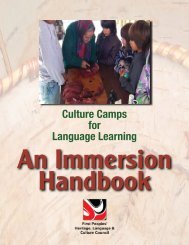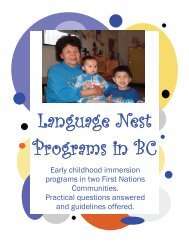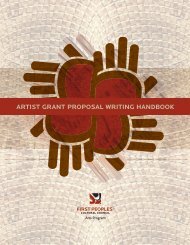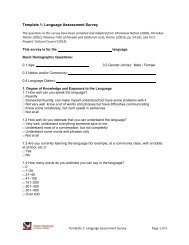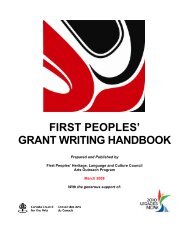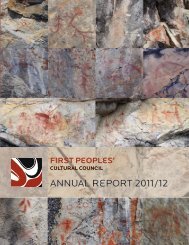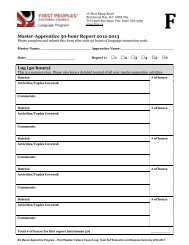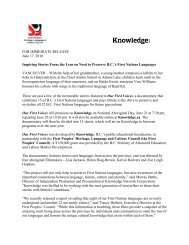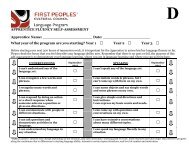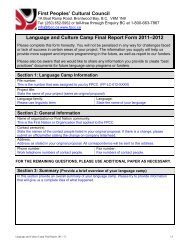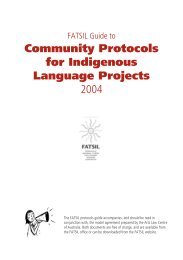What is the status of BC First nations languages? - First Peoples
What is the status of BC First nations languages? - First Peoples
What is the status of BC First nations languages? - First Peoples
Create successful ePaper yourself
Turn your PDF publications into a flip-book with our unique Google optimized e-Paper software.
<strong>What</strong> <strong>is</strong> <strong>the</strong> <strong>status</strong> <strong>of</strong> B.C. <strong>First</strong> Nations <strong>languages</strong>?sufficient computer skills, internet access and/or accessto computers. In addition to <strong>the</strong> creating moreonline language archives and promoting awareness<strong>of</strong> <strong>the</strong> value <strong>of</strong> electronic archiving, communitiesneed capacity building for using new technologies,as well as skills training and increased access tocomputers.Summary <strong>of</strong> <strong>the</strong> Status <strong>of</strong>B.C. <strong>First</strong> Nations LanguagesSpeakers• Fluent speakers make up only 5.1% (5,609) <strong>of</strong><strong>the</strong> total population* and <strong>the</strong> vast majority <strong>of</strong><strong>the</strong>m are elders.• Semi-speakers make up only 8.2% (8,948) <strong>of</strong><strong>the</strong> population* and less than 40% <strong>of</strong> <strong>the</strong>m areunder <strong>the</strong> age <strong>of</strong> 24.Usage• <strong>First</strong> Nations language learners make up only11.1% (12,223) <strong>of</strong> <strong>the</strong> total population.*• Although <strong>the</strong>re <strong>is</strong> great variability betweenschools, an average <strong>of</strong> about seven hours perweek <strong>is</strong> spent on language in <strong>First</strong> Nations-operatedschools and only about five hours in HeadStart programs. However, excluding immersionprograms, in reality only about one to four hoursper week are spent on <strong>First</strong> Nations language inmost schools.• Not all students attending a <strong>First</strong> Nations-operatedschool or Head Start program are learninga <strong>First</strong> Nations language. About 34% (1,923) <strong>of</strong>students who are attending a Head Start programor a <strong>First</strong> Nations-operated school are reportedas not learning <strong>the</strong>ir <strong>First</strong> Nations language.*The Total B.C. <strong>First</strong> Nations population used in th<strong>is</strong> report <strong>is</strong> 109,588.• In <strong>the</strong> vast majority <strong>of</strong> communities, language <strong>is</strong>rarely if ever used in <strong>the</strong> home, government, mediaor community, or for daily communication.• There <strong>is</strong> no secure standardized educationplan in B.C. to ensure <strong>the</strong> creation <strong>of</strong> fluentspeakers.Language Resources• Only about 31% (53) communities have recordings<strong>of</strong> <strong>the</strong>ir language available as a communityresource. The quality <strong>of</strong> many <strong>of</strong> <strong>the</strong>se recordings<strong>is</strong> poor.• Only about 52% (88) communities have any sort<strong>of</strong> curriculum materials for teaching <strong>the</strong> <strong>languages</strong>.Of course <strong>the</strong> schools providing languageprogramming have curricula, and some communitiesmay have curricula but little to no opportunityto use it and/or fur<strong>the</strong>r develop it. Many<strong>of</strong> <strong>the</strong>se curricula are very limited and have notbeen developed for many levels <strong>of</strong> languagelearners.• Only about 39% (66) communities reported tohave access to a <strong>First</strong>Voices.com archive <strong>of</strong> <strong>the</strong>irlanguage.Based on <strong>the</strong> <strong>First</strong> <strong>Peoples</strong>’ Council frameworkfor defining and measuring language endangermentand according to <strong>the</strong> three main variablesin <strong>the</strong> framework, Speakers, Usage and LanguageResources (see Table 1), all <strong>of</strong> B.C. <strong>First</strong> Nations<strong>languages</strong> are critically endangered, if not sleepingalready.All <strong>of</strong> B.C. <strong>First</strong> Nations <strong>languages</strong> are criticallyendangered, if not sleeping already.22Report on <strong>the</strong> Status <strong>of</strong> B.C. <strong>First</strong> Nations Languages


